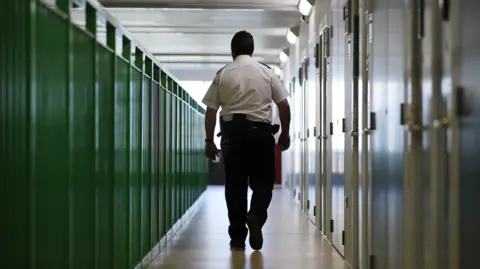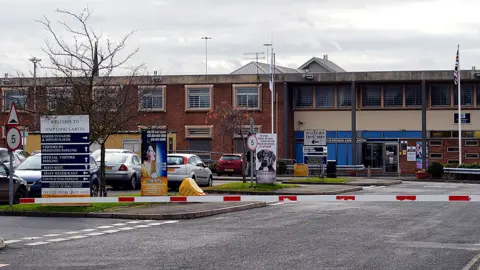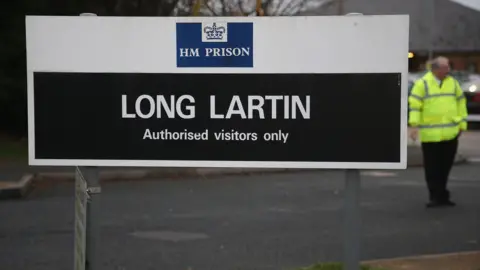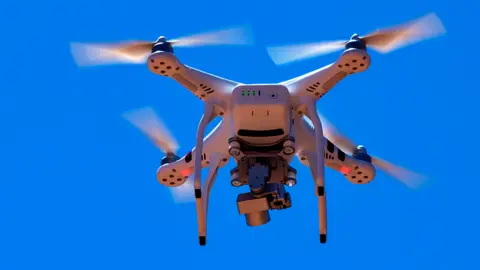'Floodgates' opened on prison drones
 Getty Images
Getty ImagesA former prison officer at a high-security jail where a member of staff was recently stabbed by an inmate, has said the "floodgates" have been opened on the use of drones to smuggle in weapons and drugs.
A 25-year-old prison officer was stabbed at Long Martin on 30 May and had to undergo emergency surgery. At the time, a source told the BBC the knife used was "not a prison-made weapon".
A former officer at Long Lartin, who we are calling Adam, said the problem had got worse in recent years, with drones coming in "left, right, and centre".
In response, the government said it had "inherited a prison system in crisis - overcrowded, with drugs and violence rife", but was addressing the problems.
"We are gripping the situation and clamping down on illicit items through X-ray body scanners and restricted fly zones for drones, " a Ministry of Justice spokesperson said.
Adam said the extent of drone use had initially come as a surprise.
"We knew it could happen in city prisons without high funding, like Hewell and Birmingham, but not in high-security prisons," he said. "But the floodgates have opened."
"We used to smell a bit of weed at night time - you'd identify the cell and put that person in for a drug test.
"But it got so bad, you could be walking up the corridors to the wings and it could stink of weed."
The former prison officer said inmates would make their own weapons "out of anything", including melting down razor blades or sharpening tooth brushes.
But he said these makeshift weapons were not as dangerous as the knives that were being flown in.
A spokesperson for the Prison Officers' Association (POA) told the BBC it had warned governments for some time "about the dangers posed by the use of drones to deliver contraband such as drugs, mobile phones, weapons into jails".
"This is unquestionably increasing the risks to staff, and destabilising prisons," they added.
"Without action, it is only a matter of time until a firearm is delivered to a prison by drone."
 PAUL ELLIS/AFP via Getty Images
PAUL ELLIS/AFP via Getty ImagesIn a 2023 report by HM Inspectorate of Prisons, after an unannounced visit of Long Lartin in December 2022, an inspector said: "The prison had good defences against the ingress of drugs through drones or throwovers."
However, by January 2025, the Chief Inspector of Prisons, Charlie Taylor, called for "urgent action" to tackle drones at HMP Long Lartin and HMP Manchester following inspections in September and October 2024.
The 2025 Long Lartin report said: The risks are clear for a jail that has, in effect, ceded the airspace above it to serious organised crime."
Fifty per cent of Long Lartin inmates who responded to a survey by the inspectorate also said it was easy to get drugs and alcohol, which the report said "was an astonishing rate for a Category A prison".
Attacks on staff
The 25-year-old prison officer who was attacked in May is now recovering at home after having emergency surgery, according to a social media post made by his girlfriend.
Adam, who knows the victim, told the BBC: "He's a good kid - keen and enthusiastic. He's not an idiot, he's not mean and nasty."
However, the attack on him is not an isolated incident.
A Freedom of Information (FOI) request sent by the BBC to the Health and Safety Executive (HSE) revealed Long Lartin had 35 incidents over the past five years in which officers missed at least a week of work either following a physical assault or through an injury sustained while restraining an inmate.
 Getty Images
Getty ImagesIn 2022 alone, 13 incidents had to be reported by the prison to the HSE.
This included an officer suffering burns after a prisoner threw boiling water over them, while another received an inch-deep puncture wound to the neck after visiting a prisoner's cell.
In another case, an officer was "choked out of consciousness" by a prisoner after responding to an emergency bell.
On one occasion, Adam said a senior governor had her jaw broken by an inmate.
Nine attacks took place in 2024, including an officer being knocked out after being punched in the head and kicked by a prisoner while supervising his move to a workshop.
Adam mentioned a number of factors to the BBC that he believed were making the environment more dangerous to staff.
He said a full lockdown search of the jail had not been performed since the Covid pandemic, and that inmates could hide weapons in places guards would be unable to find during basic checks due to screwdrivers being flown into the prison - making it easier to hide contraband in furniture.
 Mark Newman / Getty Images
Mark Newman / Getty ImagesAdam also claimed there were no thorough searches conducted after drones would be seen over the prison.
When attacks did happen, Adam said there were rarely significant consequences.
He said staff had "very little faith" in the official adjudication process, intended to deal with such incidents involving inmates.
'The job's not worth it'
Adam said the situation at Long Lartin had got "worse and worse" over the years, with staff not feeling safe at work.
He told the BBC that one governor even said "prisons aren't a place where you're supposed to feel safe" and that they would be surprised if staff at work felt safe.
This response was made in reply to concerns about proposals to have just one uniformed officer in workshops with inmates, led by civilians.
"More and more experienced staff are saying the job's not worth it," Adam said.
The MOJ told the BBC: "We take the safety and wellbeing of staff extremely seriously.
"To further protect our hardworking staff, front-line prison officers working in the highest risk areas will be given protective body armour to keep them safe from harm."
They also said the prison service was working with police to deter illegal drone use around prisons, and that they were investing targeted countermeasures such as improvements to windows, netting and grilles, to stop drones from successfully delivering cargo such as drugs and weapons.
Follow BBC Hereford & Worcester on BBC Sounds, Facebook, X and Instagram.
